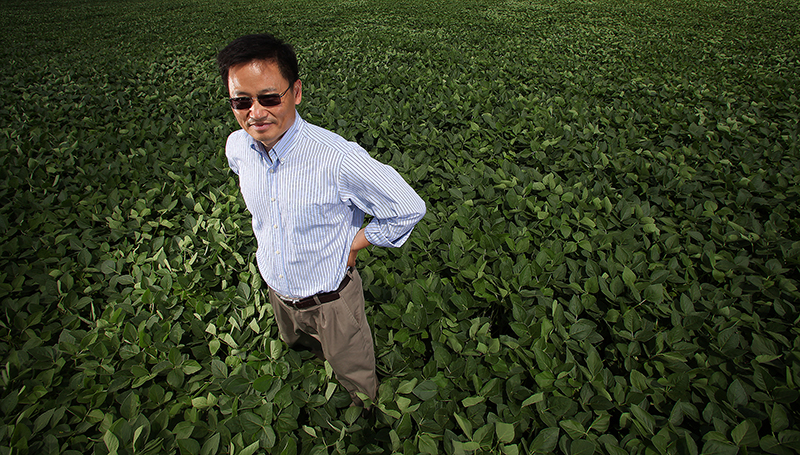July 11, 2016
Zhu selected as 2016 recipient of Purdue's Herbert Newby McCoy Award
 Jian-Kang Zhu is recognized for his groundbreaking contributions to furthering understanding of the mechanisms and role of epigenetics in biology. (Purdue Agricultural Communication Award/Tom Campbell)
Download image
Jian-Kang Zhu is recognized for his groundbreaking contributions to furthering understanding of the mechanisms and role of epigenetics in biology. (Purdue Agricultural Communication Award/Tom Campbell)
Download image
WEST LAFAYETTE, Ind. – Jian-Kang Zhu, Purdue University distinguished professor in Horticulture and Landscape Architecture, is the recipient of the 2016 Herbert Newby McCoy Award, the university’s top research honor in the natural sciences.
The award recognizes Zhu for his groundbreaking contributions to furthering understanding of the mechanisms and role of epigenetics in plant biology.
“Dr. Zhu is among the world’s most highly cited biologists. His pioneering research has uncovered the signaling pathways that govern plant responses to environmental stress,” said Suresh Garimella, Purdue’s executive vice president for research and partnerships and the Goodson Distinguished Professor of Mechanical Engineering. “The scope of his research contributions on epigenetics and plant science has great potential to improve crop productivity and human health.”
The McCoy Award, established in 1964 by Ethel Terry McCoy in memory of her husband, a distinguished Purdue alumnus, is presented annually to a Purdue student or faculty member for outstanding contributions to the natural sciences. The award comes with a cash prize of $4,000 and $7,000 for Zhu's university scholarly activities.
“It is gratifying to know that the Purdue community recognizes the important work in plant epigenetics by my team, which includes students and postdoctoral researchers,” Zhu said. “I look forward to staying active in this research to help understand the epigenetic code of life for crop improvement and human health.”
Zhu’s research seeks fundamental discoveries about epigenetics and abiotic stress tolerance, and he uses the power of genetics to link them to crop improvement. Abiotic stress - how nonliving elements in the environment affect plants - is a leading cause of crop losses.
Adaptation to changing abiotic factors is key to maintaining yield as irrigation increases salinity across greater land area and global climate change simultaneously reduces water availability and increases heat stress.
Since arriving at Purdue in 2010, Zhu has added to his longstanding body of work in elucidating plant responses to salinity, drought and cold stresses.
Among his accomplishments, Zhu has created novel technologies to manipulate gene expression in crop plants, permitting fundamental discovery in plant genetics to be implemented in crops. He is a pioneer in CRISPR-mediated manipulation of plant genes. The powerful gene-editing technology has permitted the plant genetic research community to manipulate genes outside model systems.
The toolkit available as a result of his work has been used for scientific discoveries for enhancing crop yield and stress adaptation. His work has spurred a developing core facility that is part of the Purdue plant sciences initiative, a component of Purdue Moves, a series of university programs designed to broaden the university’s global impact and enhance educational opportunities for its students.
“In Jian-Kang Zhu, Purdue University faculty have a colleague who has numerous scholarly accomplishments,” said Brian Dilkes, associate professor of biochemistry, and Robert Joly, professor of horticulture, who nominated Zhu for the award. “During the past five years, he has expanded his international reputation by making pioneering and accelerating breakthroughs in understanding the connections between abiotic stress perception and the epigenetic regulation of genes.”
Zhu earned his bachelor's degree in soils and agricultural chemistry from Beijing Agricultural University; his master's degree in botany from the University of California, Riverside; and his doctorate in plant physiology from Purdue. Prior to his work at Purdue, he held positions in his research areas at Auburn University; the University of Arizona; UC, Riverside; and the Plant Stress Genomics Research Center at King Abdullah University of Science and Technology, Kingdom of Saudi Arabia. He has served as director of the Shanghai Center for Plant Stress Biology, Chinese Academy of Sciences, since 2012.
Zhu was elected to membership in the U.S. National Academy of Sciences in 2010.
As the 2016 awardee, Zhu will deliver the Herbert Newby McCoy Distinguished Lecture at 3:30 p.m. Oct. 31 in Stewart Center's Fowler Hall. The lecture is free and open to the public.
Writer: Keith Robinson, 765-494-2722, robins89@purdue.edu
Sources: Suresh Garimella, 765-494-6209, sureshg@purdue.edu
Jian-Kang Zhu, zhu132@purdue.edu
Brian Dilkes, 765-4940-2584, bdilkes@purdue.edu
Robert Joly, 765-496-0060, joly@purdue.edu
Agricultural Communications: (765) 494-2722;
Keith Robinson, robins89@purdue.edu
Agriculture News Page

